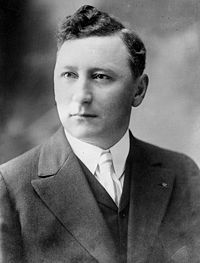Frederick Nicholas Zihlman
Frederick Nicholas Zihlman (born October 2, 1879 in Carnegie , Allegheny County , Pennsylvania , † April 22, 1935 in Cumberland , Maryland ) was an American politician . Between 1917 and 1931 he represented the state of Maryland in the US House of Representatives .
Career
In 1882, Frederick Zihlman came to Cumberland, Maryland with his parents, where he later attended public schools. Since 1890 he completed an apprenticeship as a glass blower. He later became active in the trade union movement. From 1904 to 1909 he headed a local group of the Flint-glass workers' Union . In 1905 and 1906 he was also a member of the federal executive committee of this union. From 1904 to 1909 Zihlman led the trade committee in Allegany County ( Allegany Trades Council ). He was also president of the Maryland State Federation of Labor in 1906 and 1907 .
Politically, Zihlman joined the Republican Party . Between 1909 and 1917 he was a member of the Maryland Senate . In the meantime he was the leader of the Republican faction there. At that time he was also working in the insurance industry and real estate trading in Cumberland. In 1914 he ran unsuccessfully for Congress . In the congressional elections of 1916 he was then elected to the US House of Representatives in Washington, DC in the sixth constituency of Maryland , where he succeeded David John Lewis on March 4, 1917 . After six re-elections he was able to complete seven legislative terms there by March 3, 1931. During this time the First World War fell . During his tenure in Congress, the 18th and 19th amendments were ratified in 1919 and 1920 . From 1919 to 1923, Zihlman served as chairman of the Post Office's Expenditure Control Committee. He was also a temporary member of the District of Columbia Administration Committee and the Committee on Labor .
In 1930 Frederick Zihlman was defeated by his predecessor David Lewis. After the end of his time in the US House of Representatives, he resumed his previous activities. In 1934 he sought his return to Congress without success. He died in Cumberland on April 22, 1935.
Web links
- Frederick Nicholas Zihlman in the Biographical Directory of the United States Congress (English)
- Frederick Nicholas Zihlman in the database of Find a Grave (English)
| personal data | |
|---|---|
| SURNAME | Zihlman, Frederick Nicholas |
| BRIEF DESCRIPTION | American politician |
| DATE OF BIRTH | October 2, 1879 |
| PLACE OF BIRTH | Carnegie , Pennsylvania |
| DATE OF DEATH | April 22, 1935 |
| Place of death | Cumberland , Maryland |

